Best of 2018: Theatre | reviews, news & interviews
Best of 2018: Theatre
Best of 2018: Theatre
American titles were everywhere but British plays and the classics got a look-in, too
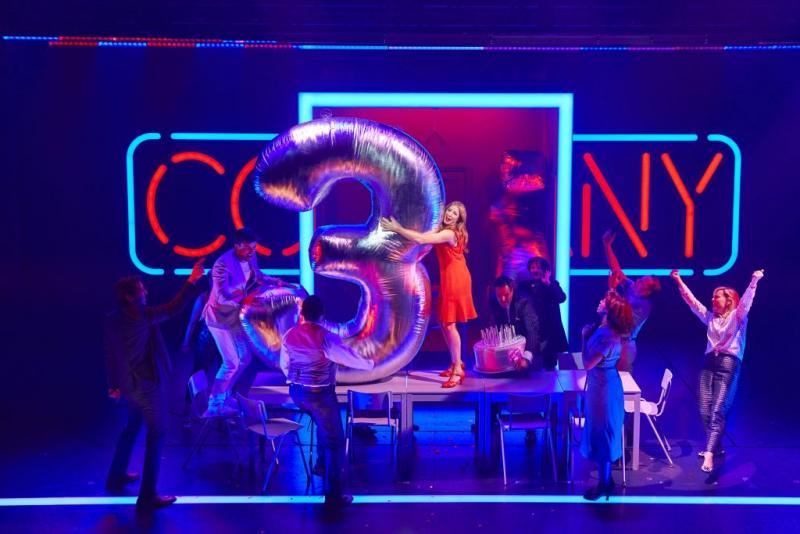
Will pride of place amongst theatre productions every year go in perpetuity to the work of Stephen Sondheim?
The seeming proliferation of all things American might not have been as evident had the British work on view been more bracing. But amid a really startlingly bad year for new English plays (the one notable exception is named below), succour could be found in the imaginative vigour brought as ever to the classics and to a genuine investment in diversity at all levels. The West End transfer of Nine Night allowed Natasha Gordon to make history as the first-ever black female playwright to be produced on the West End, while such disparate titles as Misty, the National Theatre transfer of An Octoroon, The Convert, and Poet in da Corner constituted a theatrical spectrum unimaginable even five years ago.
The commercial theatre looked more grown-up than ever amidst a climate that allowed lengthy West End runs for the Young Vic-spawned The Jungle and The Inheritance, two seismically contrasting pieces that found a shared sense of communion in the inestimable clarity of their director, Stephen Daldry. And the Almeida continued to pump out one West End-bound hit after another, even if the choicest of its offerings, The Wild Duck, was one of the few not granted an onward perch. Lastly, any argument about a fall-off at the National under Rufus Norris was scotched for keeps by the real highs of productions like The Lehman Trilogy and Antony and Cleopatra. I mean, c'mon: Nicholas Hytner's NT tenure had its duds as well (Greenland anyone, or Travelling Light), and Norris's regime highs to date certainly equal what came before. For more on these and other titles, read on.
1. The Cane, Royal Court Jerwood Theatre Downstairs
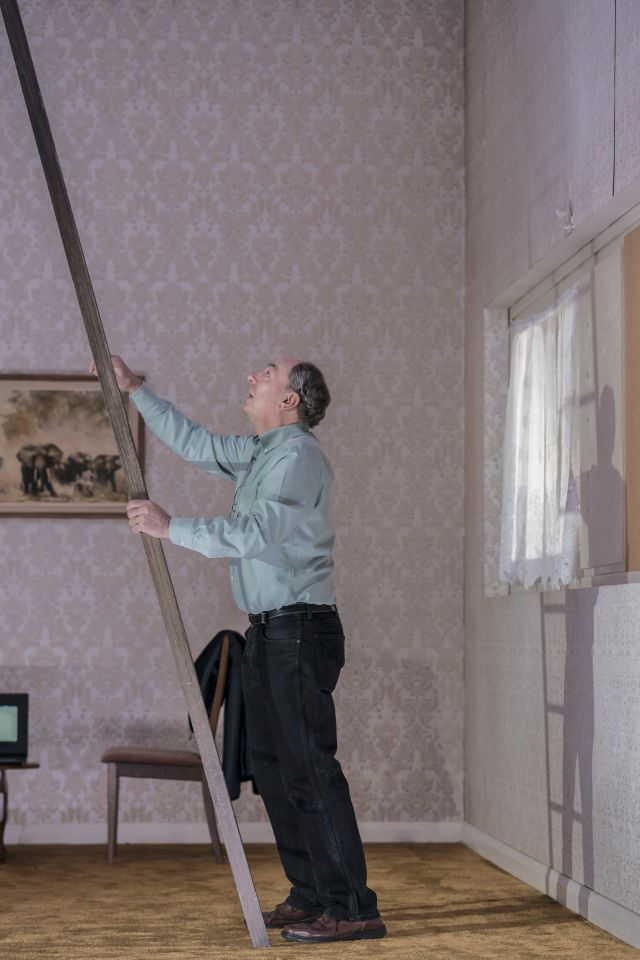 Violence stalks every terrifying corner of Mark Ravenhill's superlative play, which arrived towards year's end to redeem a year for new British writing that mostly sank from one low to another, sweeping the likes of David Hare and Martin McDonagh along with it. Then came Ravenhill's portrait of a soon-to-be-retiring schoolteacher under siege, and one found a study in provocation that moved from unseen hordes of protestors just beyond the production's visual reach to the all-too-evident abrasions felt by Alun Armstrong (pictured left, by Johan Persson) and Maggie Steed as a couple possessed of Strindbergian savagery and Nicola Walker as their even more overtly rampaging daughter. A Greek-style fury with an acid tongue, Walker's Anna is revealed to have taken the same axe to the walls of Chloe Lamford's set that the play figuratively takes to the emotions. The play is an instant, and unnerving, classic, brilliantly served by its three performers and a forensically attuned director in Vicky Featherstone.
Violence stalks every terrifying corner of Mark Ravenhill's superlative play, which arrived towards year's end to redeem a year for new British writing that mostly sank from one low to another, sweeping the likes of David Hare and Martin McDonagh along with it. Then came Ravenhill's portrait of a soon-to-be-retiring schoolteacher under siege, and one found a study in provocation that moved from unseen hordes of protestors just beyond the production's visual reach to the all-too-evident abrasions felt by Alun Armstrong (pictured left, by Johan Persson) and Maggie Steed as a couple possessed of Strindbergian savagery and Nicola Walker as their even more overtly rampaging daughter. A Greek-style fury with an acid tongue, Walker's Anna is revealed to have taken the same axe to the walls of Chloe Lamford's set that the play figuratively takes to the emotions. The play is an instant, and unnerving, classic, brilliantly served by its three performers and a forensically attuned director in Vicky Featherstone.
2. Company, Gielgud Theatre
A not-great year for musicals nonetheless saw the Sondheim reappraisal of one's dreams, this time from a director, Marianne Elliott, who between Angels in America, this, and her all-black Death of a Salesman planned for the Young Vic next year seems to be making her way through the American canon. Still, not every radical idea bears such correspondingly ripe fruit as the decision here made to re-cast the perennial male observer, Bobby, of Sondheim and George Furth's 1970 groundbreaker as the unmarried, 35-year-old female Bobbie. The twice Evening Standard-winning Rosalie Craig tore at this opportunity of a lifetime with a gallantry and grace to match Elliott's own, while the remarkable supporting cast included Matthew Seadon-Young and Ben Lewis as scene partners to die for and Richard Fleeshman as a genial himbo sporting the theatre year's best pecs and abs. As for Jonathan Bailey as the jittery gay Amy-turned-Jamie on the way to the altar, he joined Broadway's Patti LuPone – in career-peak form – to illustrate two definitions, and generations, of legendary. Can this show be somehow made available on perpetual loop?
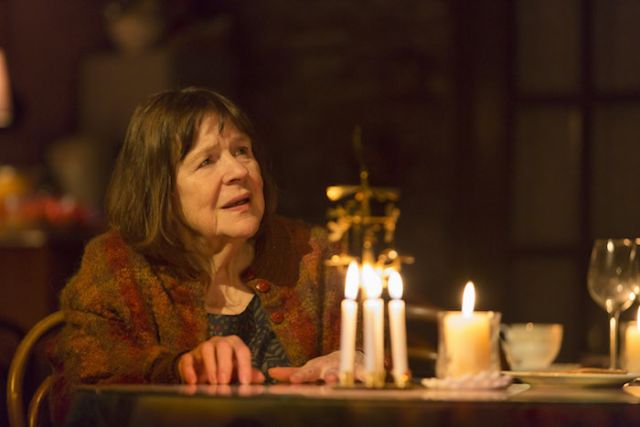 3. John, National Theatre/Dorfman
3. John, National Theatre/Dorfman
Much was made of the longer-than-usual running time of the American writer Annie Baker's mysterious and transporting play, set in a Gettysburg, Pennsylvania B&B. Well, all I can say is that come the end of its 3-1/2 hours, I could have sat through James Macdonald's beautiful production all over again, not least so as to take in the cluttered delights of the doll-filled set (The Cane's Chloe Lamford again) and a rending performance from a distinguished American visitor, Marylouise Burke (pictured above, by Stephen Cumminsky), as a landlady chattering into the void so as to stave off the fearfulness of silence. (Tom Mothersdale and Anneika Rose were in fine form, too, as Burke's often-fractious guests, as was the great June Watson as a seemingly blind onstage presence who nonetheless saw into the disturbing heart of things.) The National has been good to Baker, with this production surpassing a previous Dorfman entry of hers, The Flick: with luck, 2019 should make it a hat trick when the same venue welcomes Baker's equally transfixing (if far shorter) Off Broadway title from 2017, The Antipodes.
4. The Lehman Trilogy, National Theatre/Lyttelton
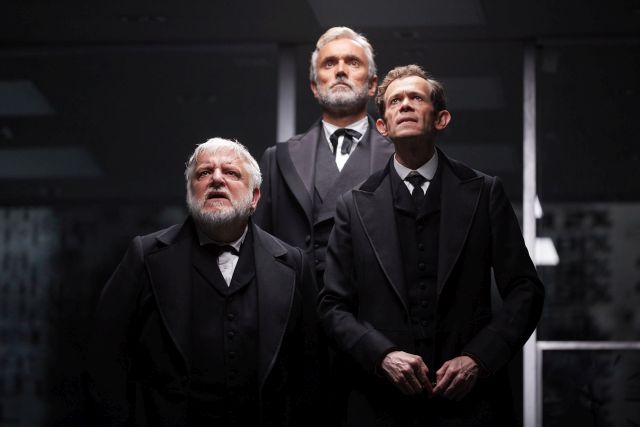 Can a second 3-1/2 hour play packed with text nonetheless feel like a virtuosic thespian ballet? That was the unexpectedly heady achievement of the director Sam Mendes's English-language premiere of an Italian epic about dynastic triumph and tribulation in the world of high finance, traced from Lehman Brothers' humble origins onwards. Telling of a financial monolith in freefall, Ben Power's adaptation of the Stefano Massini original allowed its three startling cast members to function as one elastic, shape-shifting organism. So interwoven were the performances from Simon Russell Beale, Ben Miles, and Adam Godley that it was sometimes hard to tell where the imprint left by one actor left off and that of another stepped in. Suffice it to say that audiences will have ample opportunity during 2019 to assess the show that also sparked the most spontaneous and genuine ovation of any I saw all year: while in direct stylistic contrast to Mendes's hyper-detailed work on The Ferryman, this play, too, has New York in its sights, along with a West End transfer with its unmissable trio of actors (pictured above, by Mark Douet) intact.
Can a second 3-1/2 hour play packed with text nonetheless feel like a virtuosic thespian ballet? That was the unexpectedly heady achievement of the director Sam Mendes's English-language premiere of an Italian epic about dynastic triumph and tribulation in the world of high finance, traced from Lehman Brothers' humble origins onwards. Telling of a financial monolith in freefall, Ben Power's adaptation of the Stefano Massini original allowed its three startling cast members to function as one elastic, shape-shifting organism. So interwoven were the performances from Simon Russell Beale, Ben Miles, and Adam Godley that it was sometimes hard to tell where the imprint left by one actor left off and that of another stepped in. Suffice it to say that audiences will have ample opportunity during 2019 to assess the show that also sparked the most spontaneous and genuine ovation of any I saw all year: while in direct stylistic contrast to Mendes's hyper-detailed work on The Ferryman, this play, too, has New York in its sights, along with a West End transfer with its unmissable trio of actors (pictured above, by Mark Douet) intact.
5. The Prime of Miss Jean Brodie, Donmar Warehouse
Barely had the astonishing Lia Williams laid to rest the role-swapping demands of an Almeida-spawned Mary Stuart before she tackled the hallowed ground occupied by an Oscar-winning Maggie Smith, playing the charismatic Scottish schoolteacher, Miss Brodie, given to dubious principles alongside an overwhelming magnetism. And no less scarcely had the director Polly Findlay's transformative production begun before memories of any previous Jean Brodie were displaced by the gathering portrait of psychosis delivered up by a breathless Williams. (Rona Morison and Nichola Coughlan shone, too, as students possessed of varying degrees of staying power.) Working from David Harrower's fresh version of the Muriel Spark novel, the production built towards a final cry from the heart that represented a soul in torment: a fantasist stripped bare of the armor of flamboyance to reveal a primal desperation that threatened to crack Lizzie Clachan's mausoleum-like set in two.
6. Translations, National Theatre/Olivier
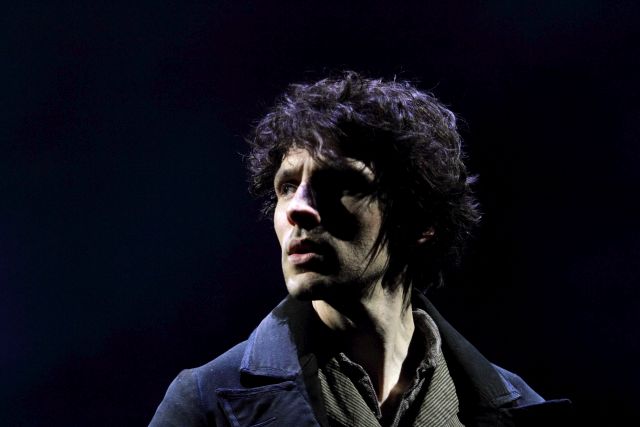 Brian Friel's 1980 play about language and power in 1830s County Donegal rang out with unexpected passion and fury in these Brexit-clogged times, not least in a closing theatrical coup from the ever-remarkable director Ian Rickson that brought the point home without a moment of pedantry. The abiding strength of Rickson's production was to lay bare the emotional expanse of a seemingly-intimate text so that it felt entirely at home in the National's largest space. That, in turn, was achieved in no small part thanks to a peerless design team in Rae Smith (sets) and Neil Austin (lighting), who between them awakened a potentially forgotten corner of a country under siege before illuminating the damage wrought with (near-literally) blinding force. Among a uniformly sublime cast, continued praise is due to Colin Morgan (pictured above, by Catherine Ashmore), who may be a TV name but is fast becoming one of the most invaluable young actors on the English stage.
Brian Friel's 1980 play about language and power in 1830s County Donegal rang out with unexpected passion and fury in these Brexit-clogged times, not least in a closing theatrical coup from the ever-remarkable director Ian Rickson that brought the point home without a moment of pedantry. The abiding strength of Rickson's production was to lay bare the emotional expanse of a seemingly-intimate text so that it felt entirely at home in the National's largest space. That, in turn, was achieved in no small part thanks to a peerless design team in Rae Smith (sets) and Neil Austin (lighting), who between them awakened a potentially forgotten corner of a country under siege before illuminating the damage wrought with (near-literally) blinding force. Among a uniformly sublime cast, continued praise is due to Colin Morgan (pictured above, by Catherine Ashmore), who may be a TV name but is fast becoming one of the most invaluable young actors on the English stage.
7. The Wild Duck, Almeida Theatre
Ibsen's 1884 play – this writer's first-among-equals masterpiece, in my view –is also one of the few classics that has been beautifully served every time I have seen it, which extends back to defining productions from Peter Hall and Michael Grandage. But none to date was as scalding, or as fully revisionist, as Robert Icke's modern-day reclamation for his home perch at the Almeida: in its own way every bit as much a "revisal" as Company, with which The Wild Duck opened in near-proximity. (The two shared a set designer in the quietly visionary Bunny Christie, a just-named OBE.) I won't soon forget the sight of the random playgoer (or so he seemed) in front of me suddenly folding up his chair so as to enter the action as a member of the cast, but such tactics existed in the service of a play about truth-telling and fakery that spoke to an age in which the two are both Trump-eted (you'll forgive the verb) and abused at every turn. And in a year rife with one remarkable female performance after another, cheers and cheers again to Lyndsey Marshal as a wife, Gina, eager to rewind the clock even as the world around her spins unalterably and headlong toward the abyss.
8. The York Realist, Donmar Warehouse
Comparisons can be unfair: what difference does it make to spectators in 2018 if someone's King Lear, say, from 1971 remains the standard-bearer for a particular commentator or critic? But for those of us lucky to have been present at both, the director Robert Hastie's Donmar revival of Peter Gill's quietly scalding The York Realist surpassed even its lauded 2002 Royal Court premiere. For that, credit Hastie's incisive approach to a play that functions as a companion piece of sorts to the gay-themed My Night with Reg, which Hastie previously directed to acclaim at this same address. Meanwhile, there remains no praise too high for the symbiotic leading performances of Ben Batt and Jonathan Bailey (the latter having quite a year between this and Company) as reluctant lovers reaching across a divide of geography, education and class to communicate a landscape of longing and loss that exists beyond words: exquisite.
9. Yous Two, Hampstead Theatre Downstairs
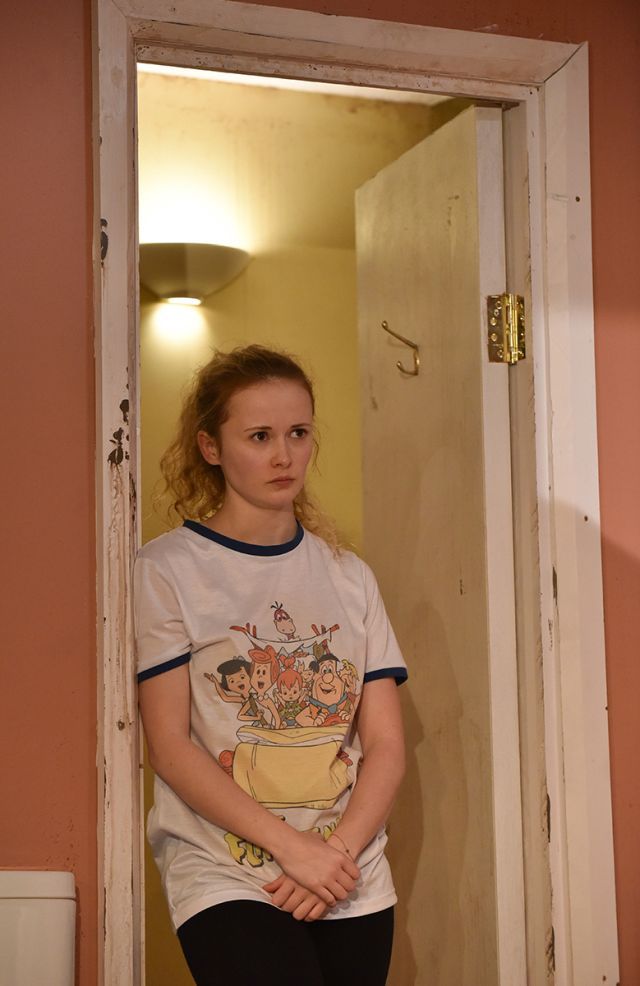 While the Hampstead's mainstage rolled out the American titles, of which Stephen Karam's Tony-winning The Humans was the obvious local premiere of choice, the tiny, flexible downstairs space did its bit for talent closer to home. That was at no point more evident than in the director Chelsea Walker's terrific staging of a premiere play by Georgia Christou about the cross-currents of affection between a teenage daughter (Shannon Tarbet, pictured right) and her layabout, brusquely-spoken father, whom we first find reclining in the bath. Will the 16-year-old Billie follow in the limited footsteps of a father she has come to treat less as a parent than as a child, or will her slow-to-surface aspirations find an outlet? The four-character, 70-minute play unfolded a funny and poignant tale of jagged emotions and shifting allegiances, leaving one keen to see where the clear-eyed Christou takes us next.
While the Hampstead's mainstage rolled out the American titles, of which Stephen Karam's Tony-winning The Humans was the obvious local premiere of choice, the tiny, flexible downstairs space did its bit for talent closer to home. That was at no point more evident than in the director Chelsea Walker's terrific staging of a premiere play by Georgia Christou about the cross-currents of affection between a teenage daughter (Shannon Tarbet, pictured right) and her layabout, brusquely-spoken father, whom we first find reclining in the bath. Will the 16-year-old Billie follow in the limited footsteps of a father she has come to treat less as a parent than as a child, or will her slow-to-surface aspirations find an outlet? The four-character, 70-minute play unfolded a funny and poignant tale of jagged emotions and shifting allegiances, leaving one keen to see where the clear-eyed Christou takes us next.
10. And the rest ....
How does one choose amongst a year whose additional bounty included a still-unfurling roster of Pinter one-acts, both familiar and little-known, that allowed the disparate likes of Antony Sher, David Suchet, and Lee Evans to stretch themselves in entirely fresh ways? Nor can one forget the raw, self-revelatory showmanship of Debris Stevenson in Poet in da Corner; the granitic force field that is Sharon D Clarke in Caroline, or Change; Ralph Fiennes as the first Antony in my experience to hold his own against his Cleopatra (here, the sinuous Sophie Okonedo); the unfettered emotional volatility and courage of The Inheritance and its twin acting pillars, the effortlessly commanding Kyle Soller and the one-man firestorm that is Andrew Burnap; and a small gem, again at the Hampstead Downstairs, in Richard Molloy's Every Day I Make Greatness Happen, with a pair of sparkling newcomers in Sofia Barclay and Moe Bar-El. Michelle Terry made for an unusually lucid and translucent Hamlet at her new home at Shakespeare's Globe, while a director new to the Donmar, Lynette Linton, ended the year with the roof-raising British premiere of the American Pulitzer-winning Sweat. 2019 may promise trying times ahead, but let's just hope that art continues to provide the best-possible and most prismatic response to life.
Explore topics
Share this article
The future of Arts Journalism
You can stop theartsdesk.com closing!
We urgently need financing to survive. Our fundraising drive has thus far raised £49,000 but we need to reach £100,000 or we will be forced to close. Please contribute here: https://gofund.me/c3f6033d
And if you can forward this information to anyone who might assist, we’d be grateful.

Subscribe to theartsdesk.com
Thank you for continuing to read our work on theartsdesk.com. For unlimited access to every article in its entirety, including our archive of more than 15,000 pieces, we're asking for £5 per month or £40 per year. We feel it's a very good deal, and hope you do too.
To take a subscription now simply click here.
And if you're looking for that extra gift for a friend or family member, why not treat them to a theartsdesk.com gift subscription?
more Theatre
 The Maids, Donmar Warehouse review - vibrant cast lost in a spectacular-looking fever dream
Kip Williams revises Genet, with little gained in the update except eye-popping visuals
The Maids, Donmar Warehouse review - vibrant cast lost in a spectacular-looking fever dream
Kip Williams revises Genet, with little gained in the update except eye-popping visuals
 Ragdoll, Jermyn Street Theatre review - compelling and emotionally truthful
Katherine Moar returns with a Patty Hearst-inspired follow up to her debut hit 'Farm Hall'
Ragdoll, Jermyn Street Theatre review - compelling and emotionally truthful
Katherine Moar returns with a Patty Hearst-inspired follow up to her debut hit 'Farm Hall'
 Troilus and Cressida, Globe Theatre review - a 'problem play' with added problems
Raucous and carnivalesque, but also ugly and incomprehensible
Troilus and Cressida, Globe Theatre review - a 'problem play' with added problems
Raucous and carnivalesque, but also ugly and incomprehensible
 Clarkston, Trafalgar Theatre review - two lads on a road to nowhere
Netflix star, Joe Locke, is the selling point of a production that needs one
Clarkston, Trafalgar Theatre review - two lads on a road to nowhere
Netflix star, Joe Locke, is the selling point of a production that needs one
 Ghost Stories, Peacock Theatre review - spirited staging but short on scares
Impressive spectacle saves an ageing show in an unsuitable venue
Ghost Stories, Peacock Theatre review - spirited staging but short on scares
Impressive spectacle saves an ageing show in an unsuitable venue
 Hamlet, National Theatre review - turning tragedy to comedy is no joke
Hiran Abeyeskera’s childlike prince falls flat in a mixed production
Hamlet, National Theatre review - turning tragedy to comedy is no joke
Hiran Abeyeskera’s childlike prince falls flat in a mixed production
 Rohtko, Barbican review - postmodern meditation on fake and authentic art is less than the sum of its parts
Łukasz Twarkowski's production dazzles without illuminating
Rohtko, Barbican review - postmodern meditation on fake and authentic art is less than the sum of its parts
Łukasz Twarkowski's production dazzles without illuminating
 Lee, Park Theatre review - Lee Krasner looks back on her life as an artist
Informative and interesting, the play's format limits its potential
Lee, Park Theatre review - Lee Krasner looks back on her life as an artist
Informative and interesting, the play's format limits its potential
 Measure for Measure, RSC, Stratford review - 'problem play' has no problem with relevance
Shakespeare, in this adaptation, is at his most perceptive
Measure for Measure, RSC, Stratford review - 'problem play' has no problem with relevance
Shakespeare, in this adaptation, is at his most perceptive
 The Importance of Being Earnest, Noël Coward Theatre review - dazzling and delightful queer fest
West End transfer of National Theatre hit stars Stephen Fry and Olly Alexander
The Importance of Being Earnest, Noël Coward Theatre review - dazzling and delightful queer fest
West End transfer of National Theatre hit stars Stephen Fry and Olly Alexander
 Get Down Tonight, Charing Cross Theatre review - glitz and hits from the 70s
If you love the songs of KC and the Sunshine Band, Please Do Go!
Get Down Tonight, Charing Cross Theatre review - glitz and hits from the 70s
If you love the songs of KC and the Sunshine Band, Please Do Go!
 Punch, Apollo Theatre review - powerful play about the strength of redemption
James Graham's play transfixes the audience at every stage
Punch, Apollo Theatre review - powerful play about the strength of redemption
James Graham's play transfixes the audience at every stage

Add comment